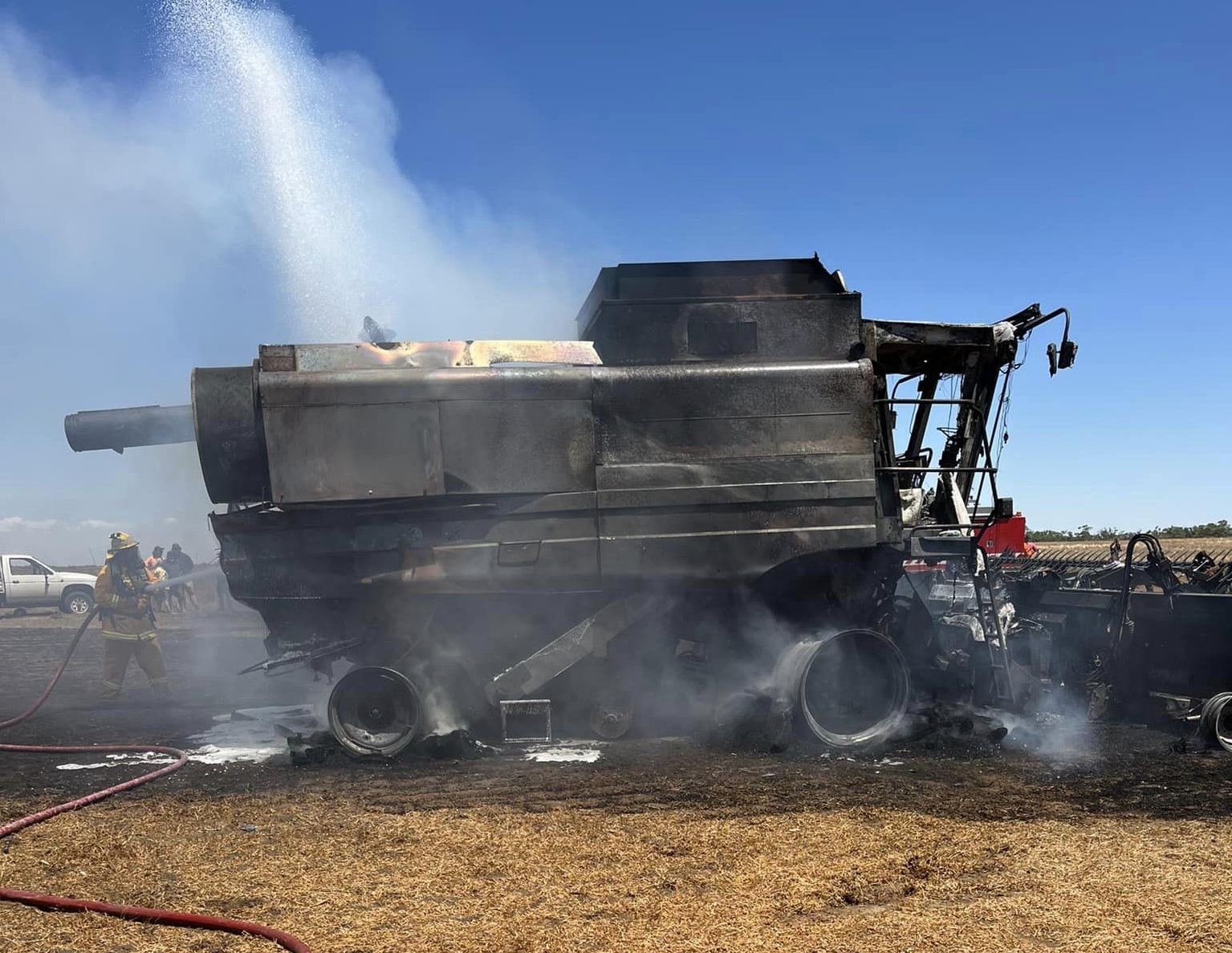 Photo: Fire incident in Tittybong last week.
Photo: Fire incident in Tittybong last week.
CFA is warning south-west farmers to take care with their harvesting, especially following significant rain last spring which has led to prolific growth and delayed both the fire and harvesting season.
Already this year, CFA has responded to a spate of fires caused by, or in harvesters, across the south-west region of Victoria.
In CFA’s District 5 there have been three fires caused by, or involving, harvesters in the past week, including the total loss of a harvester and 10 hectares of wheat crop at Hexham on Tuesday afternoon.
Volunteers in other CFA districts across the west have also responded to over a dozen fires during this time.
CFA District 5 Commander David Ferguson warned farmers and the community that harvest time can be very dangerous and they need to take extra precautions.
“The vegetation is drying out quite quickly now, and unfortunately we are seeing increasing numbers of machinery and vehicles start fires in our part of the state,” he said.
“On average CFA volunteer firefighters respond to more than 200 harvesting-related fires a year.”
“Not only do these fires put pressure on our volunteers, many of whom are farmers themselves, but it also puts farmers’ profits and safety at risk.”
Commander Ferguson said even small fires can quickly spread to the whole paddock within minutes, so it's vital to be prepared and exercise caution when preparing to harvest.
“Awareness is the key to avoiding harvester fires,” he said.
Farmers are working in challenging conditions as they harvest their crops, and the machinery is working particularly hard this year with the heavy crops.
"It’s important that machinery and equipment are regularly maintained and cleaned, as well as inspected thoroughly before and during use.
“Hot and dry conditions are a particular concern for CFA;. If it’s a high fire risk day, our advice is to postpone any work that was planned to be conducted in the paddock.”
CFA reminded farmers to ensure machinery such as headers are routinely maintained, moving parts and bearings are regularly inspected and cleaned of any material on hot engine components.
“It should be part of everyone’s routine to check for straw or grass build-up in machinery, to maintain its spark arrestors, and to take regular breaks when operating machinery to ensure it doesn’t get too hot,” Commander Ferguson said.
CFA reminded farmers to have adequate firefighting resources available in paddocks where harvesting operations are conducted and advised against driving vehicles and motorbikes through dry grass as an exhaust can ignite dry grass underneath on hot days.
“Farm machinery should also carry fire suppression equipment such as a knapsack spray pump or water fire extinguisher.”
For more information on harvesting fire safety, visit the CFA website at cfa.vic.gov.au/plan-prepare/how-to-prepare-your-property/farms/harvest-fire-safety.
Crop and farm machinery fire safety tips:
- The most common cause of harvester fires is material collecting on hot engine components such as the manifold, exhaust and turbocharger.
- The key to avoiding harvester fires is diligence in clean-down and inspection.
- Postpone paddock work during the highest fire-risk periods. On hot, dry days, exercise extreme caution before harvesting, grinding, welding, slashing or mowing.
- Check the weather conditions against the Grain Harvesting Operations Guide before harvesting.
- Check for total fire ban or severe weather warnings and current fire incidents and follow recommendations.
- Avoid driving vehicles and motorbikes through dry grass or crop - the risk from the hot exhaust system is high. Driving vehicles with catalytic converters or diesel particulate filters through dry grass and crops is particularly hazardous.
- Take regular breaks.
- Make it part of your routine to check for straw or grass build-up, and hot bearings.
- Check machinery to ensure that spark arrestors are maintained.
- Prepare a communication plan that includes family, contractors and neighbours.
- Prepare strategic fire breaks to stop fires entering or leaving your property.
- Run regular maintenance checks on farm machinery.
- Monitor machinery regularly during operations.
- Monitor weather conditions throughout the day and stop operations if it becomes hot and dry.
- During paddock operations have the appropriate firefighting equipment in place. You’re required by law, to have a 9-litre water pressured extinguisher on hand.